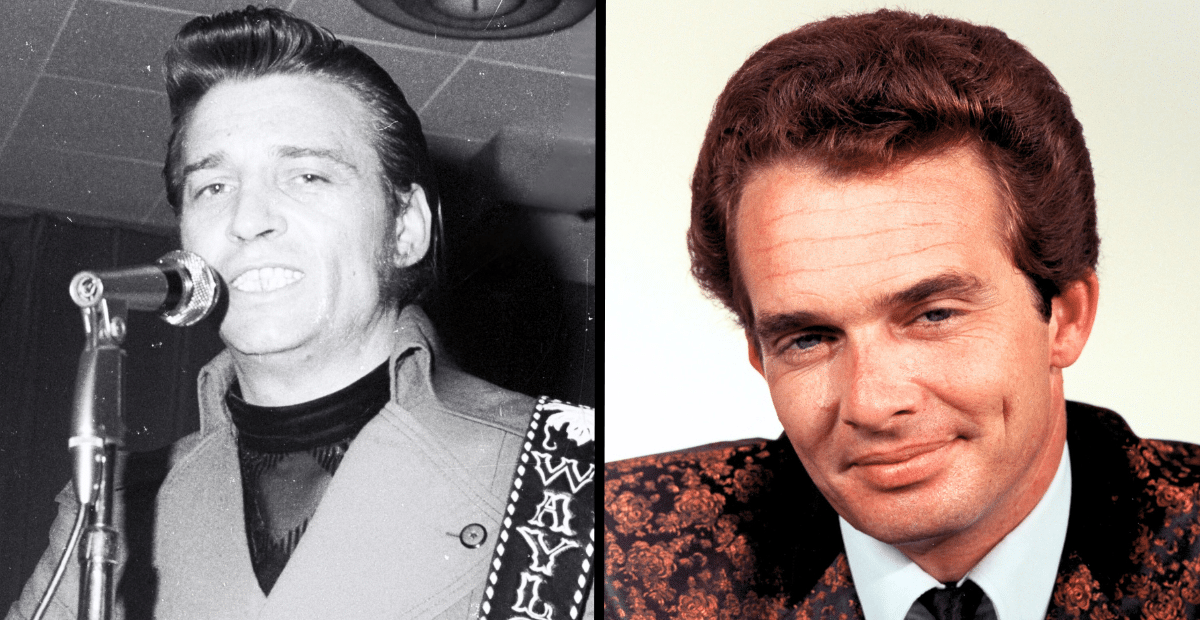7 ’70s Country Hits That Are Now Considered Offensive Today
on Jan 07, 2025 • Updated Jan 24, 2025

Some Modern Listeners Think These 7 Country Hits From The ’70s Are Offensive
Several of the biggest country hits to emerge in the ’70s are labeled as “offensive” today. Simply put, some modern listeners don’t agree with the situations and attitudes described in these songs.
Perspectives have changed dramatically since the 1970s, which is why some younger fans raise an eyebrow at country songs that emerged during the decade.
All seven of the “offensive” songs on this list were hits when they debuted. But if they were released in 2025, these songs could be considered controversial from the start or perhaps even be banned from the radio.
As this list continues, we’ll share the stories behind the ’70s country hits considered offensive today and why modern listeners take issue with them.
7 Country Hits From The ’70s Fans Find Offensive In The Modern Day
“Coward Of The County” – Kenny Rogers
Roger Bowling and Billy Edd Wheeler co-wrote “Coward of the County.” Kenny Rogers released it as a single in November 1979.
As the narrator, Rogers sings about his nephew, a young boy named Tommy. Tommy earns a reputation as a “coward” because he always avoids conflicts. He adopted this attitude after his father, who died in prison, made him promise he wouldn’t follow in his footsteps. Tommy’s father said, “Son, you don’t have to fight to be a man.“
Tommy eventually falls in love with a young woman named Becky. But then something tragic happens to Becky, as Rogers sings:
“One day while he was working, the Gatlin boys came calling.
They took turns at Becky and there was three of them.”
Seeing Becky’s torn dress and “shattered” face, Tommy is consumed by rage. He seeks violent revenge against the Gatlin boys, saying, “Sometimes you gotta fight when you’re a man.“
“Coward of the County” was a massive hit. It reached the #1 spot on the Hot Country Songs chart and crossed over to claim the #3 spot on the all-genre Billboard Hot 100. It also topped the country charts in Ireland, Canada, and the UK.
But today, some fans have less-than-positive feelings about the song. The main reason for their distaste is how the horrific assault against Becky is used solely to move the plot along and “inspire” Tommy.
“The Taker” – Waylon Jennings
Waylon Jennings‘ future Highwaymen bandmate, Kris Kristofferson, co-wrote “The Taker” with Shel Silverstein. Jennings released the song as a single in 1970.
In “The Taker,” Jennings sings about a no-good man who lusts after a romantically inexperienced woman. He says:
“He’s a lover and he’ll love her in ways, that she’s never been loved before.”
The narrator (Jennings) expresses concern for the woman, knowing the other man will try to win her over with his love and charm. He fears the other man will end up “takin’ advantage” and take the woman’s “body and soul.”
“The Taker” reached the #5 spot on the Hot Country Songs chart. It also crossed over to claim the 94th slot on the all-genre Billboard Hot 100 chart.
Some modern country fans are offended that the man in the song is clearly preying on the (assumed to be) younger woman. While Jennings’ narrator expresses disgust over the other man’s actions, the song’s overall tone makes many modern country fans uncomfortable.
“Would You Lay With Me” – Tanya Tucker
Country music outlaw David Allan Coe wrote “Would You Lay With Me (In a Field of Stone.)” But Tanya Tucker was the first artist to record the song. She released her version in 1973.
The narrator of “Would You Lay With Me” passionately addresses her lover, asking:
“Would you lay with me,
In a field of stone?
If my needs were strong,
Would you lay with me?”
As the song continues, the narrator essentially asks her lover how far he’d be willing to go for her if she “gives herself” to him.
“Would You Lay with Me” reached the #1 spot on the Hot Country Songs chart and peaked at #46 on the all-genre Billboard Hot 100 chart. Numerous artists have covered the track, and many fans consider it to be one of country music’s greatest love songs.
Still, some fans take issue with “Would You Lay with Me.” Their problem doesn’t rest with the song itself, but the context behind it.
Tucker was only 15 years old when “Would You Lay with Me” debuted. With that in mind, some fans feel uncomfortable hearing her sing the suggestive lyrics knowing she was a teenager.
“You’ve Never Been This Far Before” – Conway Twitty
Twitty’s narrator sings to the woman he loves as they engage in an intimate moment. He recognizes that she’s never taken this step in a relationship before, saying:
“I don’t know what I’m saying,
As my trembling fingers touch forbidden places.
I only know that I’ve waited,
For so long for the chance that we are taking.”
“You’ve Never Been This Far Before” actually caused some controversy at the time of its release. Some felt its lyrics were far too risqué, and the song was banned from several country radio stations.
Despite this, “You’ve Never Been This Far Before” reached the #1 spot on the Hot Country Songs chart and peaked at #22 on the all-genre Billboard Hot 100.
Now, some modern listeners are offended by “You’ve Never Been This Far Before” for different reasons. They don’t mind the risqué lyrics as much, but feel uneasy about the narrator’s intense focus on it being his lover’s first time.
Much like Waylon Jennings’ “The Taker,” modern fans assume the woman in “You’ve Never Been This Far Before” is younger than the narrator. That assumption also makes them feel uncomfortable whenever the song plays.
“Heaven’s Just A Sin Away” – The Kendalls
RELATED: 15 “FORGOTTEN” COUNTRY MUSIC DUOS
Jerry Gillespie wrote “Heaven’s Just a Sin Away,” which country duo The Kendalls released as a single in 1977. The song’s narrators sing about their desire to be together and how they know they’ll find “heaven” in each other’s arms.
As the lyrics go:
“Your eyes keep tempting me and I never was that strong.
Devil’s got me now, gone and got me now.
I can’t fight him anyhow, I think he’s gonna win.
Heaven’s just a sin away, just a sin away.
Heaven help me when I say I think I’m giving in.”
“Heaven’s Just a Sin Away” was a huge hit for The Kendalls. It reached the #1 spot on the Hot Country Singles chart and the 69th spot on the all-genre Hot 100 chart.
The song also led the Kendalls to win the Grammy Award for Best Country Performance by a Duo or Group with Vocal.
Why do some listeners consider this ’70s country hit offensive today?
Like Tanya Tucker’s “Would You Lay with Me,” the reason isn’t the song itself but the background. When listening to the song, modern country fans can’t shake the fact that The Kendalls’ Royce and Jeannie Kendall were father and daughter, not husband and wife.
“The Night The Lights Went Out In Georgia” – Vicki Lawrence
Bobby Russell wrote the country classic we now know as “The Night the Lights Went Out in Georgia.” His then-wife, Vicki Lawrence, became the first to record it. She released her rendition in 1972.
The unnamed female narrator, known as “Little Sister,” relays a story. Her brother learned from his good friend, Andy, that his wife was having affairs with multiple men. Ashamed, Andy reveals that he was one of the lovers.
Fueled by anger, Brother leaves, goes home, retrieves a gun, and makes his way to Andy’s house. On his way there, he notices footprints, but they’re smaller than Andy’s.
When Brother makes it inside, he discovers that Andy has already been shot dead. After the Sheriff finds Brother at the scene of the crime with a gun, he accuses him of killing Andy. The judge swiftly hands down “justice” and sentences Brother to death by hanging.
At the end of the song, Little Sister reveals she was the person who killed Andy. She drops an additional bombshell when she shares she killed her sister-in-law (Brother’s wife) too.
“That’s one body that’ll never be found,” she sings.
“You see little sister don’t miss when she aims her gun.”
Lawrence took “The Night the Lights Went Out in Georgia” to the 36th spot on the Hot Country Songs chart. It was a #1 hit on the all-genre Billboard Hot 100 chart.
Other artists, including Tanya Tucker and Reba McEntire, covered the track in the decades that followed.
Today, some listeners find “The Night the Lights Went Out in Georgia” to be offensive since it celebrates vigilante-style justice. While modern country fans agree Andy and Brother’s wife weren’t good people, they feel they didn’t deserve to be killed just because they had an affair.
Still, modern listeners wholeheartedly agree with the song’s main message that Brother shouldn’t have been sentenced to death for a crime he didn’t commit.
“The Fightin’ Side Of Me” – Merle Haggard
Merle Haggard wrote “The Fightin’ Side of Me” and released it as a single in 1970. In the song, “The Hag” stands up for the USA and speaks out against those who disrespect it.
As the lyrics go:
“If you don’t love it, leave it,
Let this song I’m singin’ be a warnin’.
When you’re runnin’ down my country, man,
You’re walkin’ on the fightin’ side of me.”
“The Fightin’ Side of Me” battled its way to the #1 spot on the Hot Country Songs chart. It also crossed over to claim the 92nd spot on the all-genre Billboard Hot 100 chart.
Why are some listeners bothered by “The Fightin’ Side of Me” today? The song’s politically conservative tone offends some people in country music’s growing fanbase of younger and more liberal followers.
Looking At These ’70s Country Hits Through A Modern Lens
As expected, attitudes have changed significantly since the seven songs on this list debuted. That’s why some modern listeners find these ’70s country hits offensive.
Still, you can’t deny the popularity of these songs when they were released. No matter how fans may feel about them now, these songs have secured their place in country music history.
However, as we revisit these songs and look at them through a modern lens, we can acknowledge why some listeners don’t feel inclined to play them today.
If you enjoyed this list, be sure to check out our past rankings of “offensive” songs from the ’80s and ’90s.


















